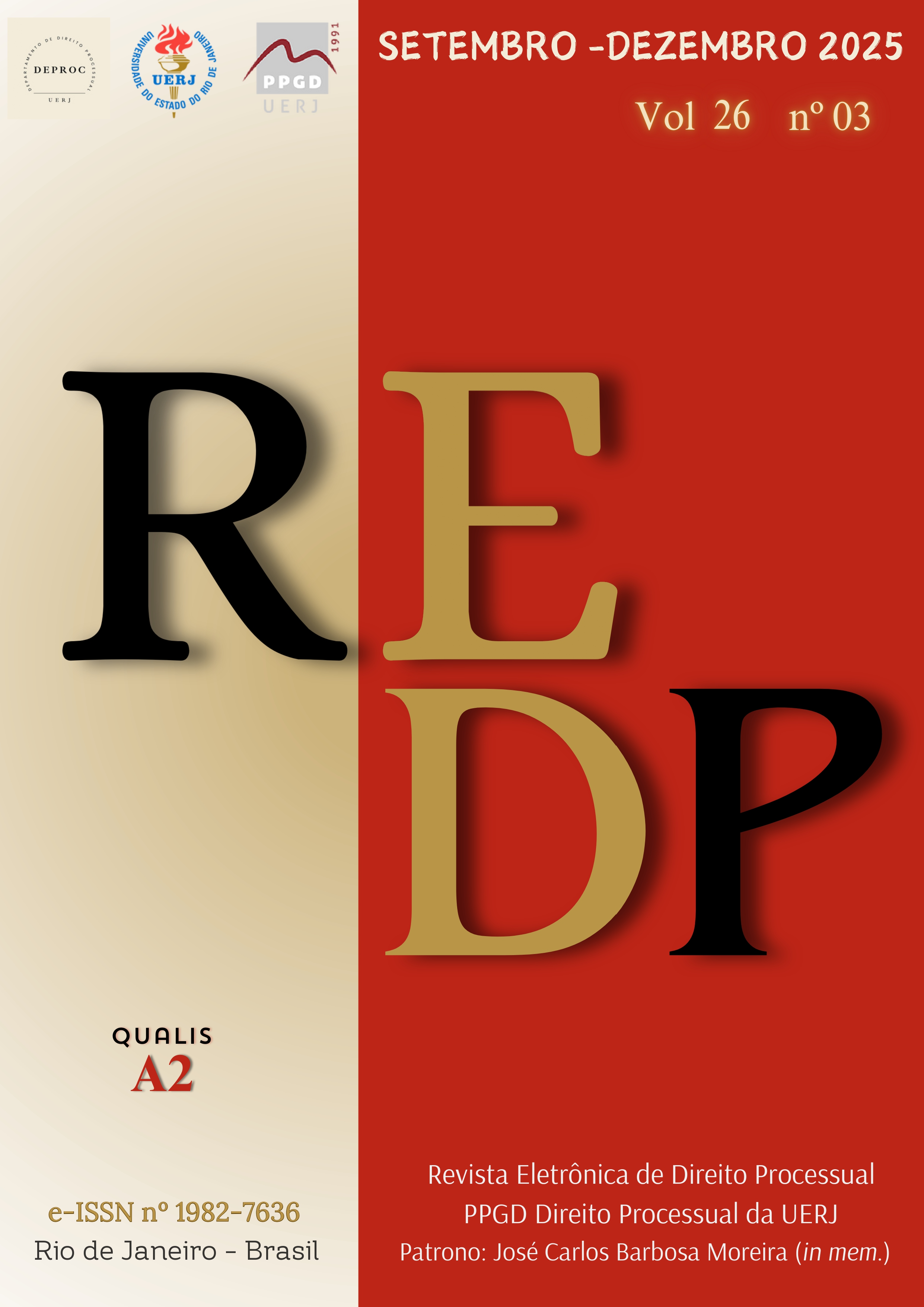A (I)RREVERSIBILIDADE DOS EFEITOS DAS DECISÕES JUDICIAIS NOS PROCESSOS PREVIDENCIÁRIOS:
A APLICAÇÃO DO TEMA N. 692 DO STJ NOS ACÓRDÃOS DO TRIBUNAL DE JUSTIÇA DO ESTADO DE SÃO PAULO
DOI:
https://doi.org/10.12957/redp.2025.84893Resumo
A codificação processual civil estabelece, como regra, que a pessoa beneficiada por tutela provisória de urgência é objetivamente responsável por indenizar ou restituir, conforme o caso, a parte prejudicada se essa medida é ulteriormente revertida pela tutela final. No entanto, a devolução de benefícios previdenciários recebidos por força de tutela antecipada posteriormente revogada suscita interpretações divergentes na jurisprudência pátria, inclusive no âmbito do Superior Tribunal de Justiça (STJ) e do Supremo Tribunal Federal (STF). Este artigo se propõe a responder ao seguinte problema de pesquisa: em que medida o Tribunal de Justiça do Estado de São Paulo (TJSP) reconhece a reversibilidade dos efeitos das decisões judiciais nos processos previdenciários, mediante a aplicação do tema n. 692 do STJ nos seus acórdãos? O objetivo geral consiste em identificar em que medida o TJSP reconhece a reversibilidade dos efeitos das decisões judiciais nos processos previdenciários, por meio da aplicação do tema n. 692 do STJ nos seus acórdãos. Para tanto, o artigo examina a relação entre a tutela antecipada e a reversibilidade das decisões judiciais, nos processos previdenciários, averigua a posição do STJ e do STF sobre o tema, e estuda a jurisprudência do TJSP acerca da questão. Em relação aos aspectos metodológicos, a pesquisa classifica-se como documental e bibliográfica, bem como centra-se na Metodologia de Análise de Decisões (MAD), adotando uma abordagem quantitativa e qualitativa. Como resultados, observa-se, em síntese, que, conquanto nos exames primários de recursos de apelação prepondere a repetibilidade, a análise desses dados em conjunto com os de reapreciação para juízo de conformidade, permite concluir pela predominância, na Corte Paulista, do entendimento pela irrepetibilidade dos valores percebidos a título de tutela antecipada posteriormente reformada. Por órgão fracionário, constata-se que, dos dois órgãos competentes para exame da matéria, a 16ª Câmara de Direito Público decidiu, majoritariamente, pela irrepetibilidade, ao passo que a 17ª Câmara de Direito Público resolveu todos os casos que lhe foram submetidos pela repetibilidade, em aplicação ao tema n. 692 do STJ. Conclui-se que a dissonância interna do TJSP prejudica a coerência e a integridade de sua jurisprudência, em contrariedade ao art. 926 do CPC/2015, e que a prevalência percentual dos julgados que não se submetem ao tema fixado pelo STJ ofende o sistema de precedentes disposto no art. 927, III, do CPC/2015, causando insegurança jurídica e imprevisibilidade para os jurisdicionados e descredibilidade para o Poder Judiciário.
Downloads
Publicado
Como Citar
Edição
Seção
Licença
Copyright (c) 2025 Mônica Mota Tassigny, Paula Valverde Santos, Paulo Henrique Lima Soares

Este trabalho está licenciado sob uma licença Creative Commons Attribution 4.0 International License.
Todos os artigos publicados na Revista Eletrônica de Direito Processual (REDP) (Departamento de Direito Processual, Universidade do Estado do Rio de Janeiro, Brasil) são licenciados por meio de uma Licença Creative Commons - Atribuição 4.0 Internacional (CC BY 4.0).
Os autores retêm os direitos autorais de seu artigo e concordam em licenciar seu trabalho com a licença CC BY 4.0, aceitando assim os termos e condições específicos desta licença disponíveis no seguinte website: https://creativecommons.org/licenses/by/4.0/legalcode.
- Os autores concedem à REDP o direito de primeira publicação, de se identificar como publicadora original do trabalho e concedem à revista uma licença de direitos não exclusivos para utilizar o trabalho das seguintes formas: Reproduzir, vender e distribuir cópias eletrônicas ou impressas do manuscrito como um todo, de partes específicas do manuscrito e de suas traduções para qualquer idioma;
- O uso do artigo por terceiros é livre, contanto que a integridade da publicação seja mantida e seus autores originais, periódico de primeira publicação e detalhes de citação sejam identificados.
Dentro dos termos da licença, os autores podem entrar em acordos contratuais adicionais separados para a distribuição não exclusiva da versão publicada do trabalho na revista.
Copyright and Licensing
All articles published in the Procedural Law Electronic Review (REDP) (Department of Procedural Law, State University of Rio de Janeiro, Brazil) are licensed under a Creative Commons License - Attribution 4.0 International (CC BY 4.0).
- Authors retain copyright to their article and agree to license their work under the CC BY 4.0 license, thereby accepting the specific terms and conditions of this license available at the following website: https://creativecommons.org/licenses/by/4.0/ legal code.
- Authors grant REDP the right of first publication, to identify itself as the original publisher of the work, and grant the journal a non-exclusive license to use the work in the following ways: Reproduce, sell and distribute electronic or printed copies of the manuscript as a whole, of specific parts of the manuscript and its translations into any language;
- Use of the article by third parties is free, as long as the integrity of the publication is maintained and its original authors, first publication journal, and citation details are identified.
Within the terms of the license, authors may enter into separate additional contractual agreements for the non-exclusive distribution of the published version of the work in the journal.




